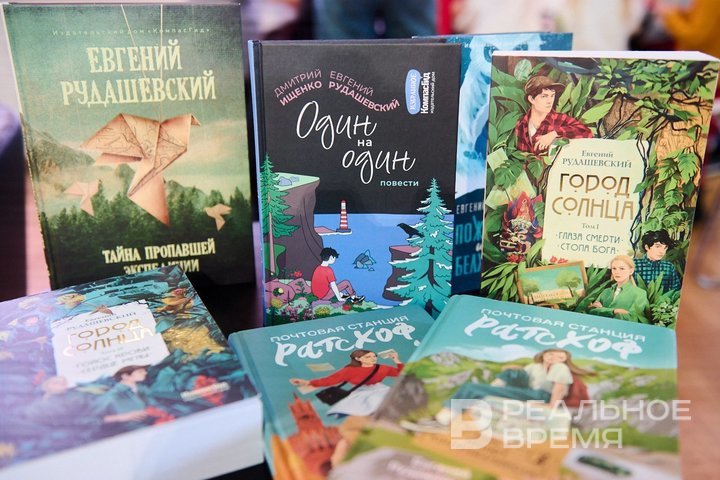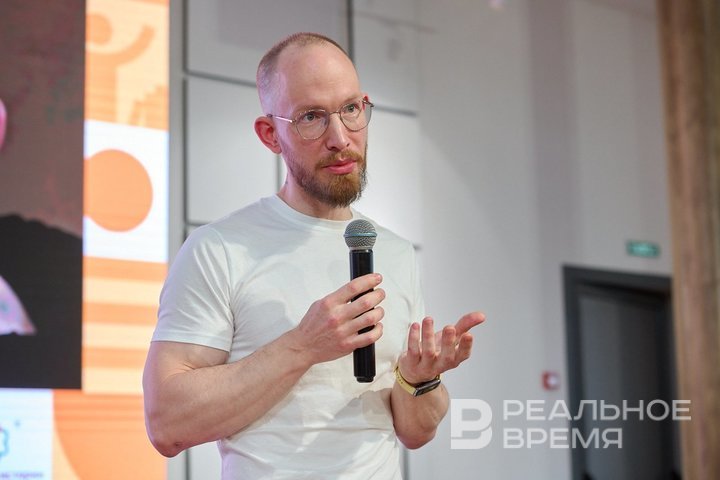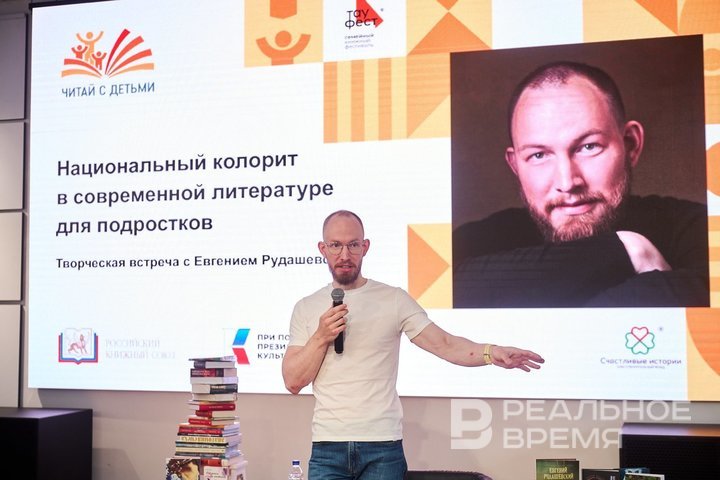‘We all come from the same pot’: Yevgeny Rudashevsky explains the meaning of national colour in literature
How immersion in a foreign culture helps to understand your place in the world

At Tau children's book festival, author of adventure books for teenagers Yevgeny Rudashevsky revealed important details of the creation of his books and explained why national colour was not just decoration but the key to understanding yourself.
Details define everything
“Adventures are always hyperbole,” Yevgeny Rudashevsky began his discussion about the importance of details in the adventure genre with this phrase. Details are those small fragments of reality that give the reader the opportunity to literally “enter” the book, to feel its atmosphere. “When you work out an adventure plot, you go directly to the locations where this plot will develop, and you, accordingly, look for small details that you can use,” Rudashevsky explained. These are not just conventional descriptions of tourist places, but real background: smells, sounds, customs that make up the cultural code.
These details turn a geographical map into a living environment. Even if you have never been to the place being described, thanks to such nuances it becomes visible, tangible. “Sitting on the couch, we open an adventure novel to enjoy some twists and turns that we will most likely never encounter in life,” the author said.

Rudashevsky turned to the classics of the adventure genre. For example, Henry Rider Haggard created fascinating worlds in his novels. However, according to Yevgeny, he used a colonial view of other civilisations, which may be raising questions today. “If we read the same Henry Rider Haggard, the same King Solomon's Mines, we will see that thousands of people die there. Literally, genocide of the local population is being carried out there,” the writer commented. He put an eloquent example: after a bloody battle, a Briton calmly smokes a pipe noting that “the weather is wonderful, the day is fine.” Rudashevsky emphasised that such descriptions always reflect the civilisational superiority of one people over another. This is a kind of “cultural hyperbole” that has taken root in the minds of Western readers.
Penetration from within
Modern literature tries to take a different approach to depicting foreign cultures. Yevgeny prefers models where events are described “from the perspective of a representative of an unusual culture” or a hero who is ready for a tolerant view of something foreign. “For example, same Schultz spent many years with Indians and was able to write a wonderful adventure novel, but from the point of view of the Indians themselves,” said Rudashevsky.
This approach breaks down the barrier between the reader and the characters, helping to see the world through the eyes of another. This is not just an artistic technique, but a tool that teaches us to perceive diversity.

It is noteworthy that for Rudashevsky, the balance between authenticity and entertainment is important. The author must give the reader enough texture to immerse him in another world, but at the same time avoid academic tediousness. “Here, all sorts of national small colourful details inevitably emerge, which the author of the novel invariably uses,” the writer said. And it is precisely these details that help break the patterns of perception. The more often the voices of people from different cultures are heard in books, the more we empathise with the characters belonging to these cultures, the broader our understanding of the world becomes. “We all come from the same pot,” Rudashevsky continued his speech about cultural differences. At first glance, people, no matter how different they may seem, have more in common than is commonly believed.
“Physiologically, we are not that different from each other. If you take a modern child, a baby, throw him or her 40,000 years ago into the caves of savages, and throw a baby of savages into our family, both will feel great. Each will develop in their own culture,” the writer explained.
This statement sounds like an experiment: imagine how a person with a modern brain, but without a familiar environment, adapts to new conditions. One baby will start shaking a spear, another will master a tablet. And the difference will not be in biology, but in culture.
Culture as a survival manual
But why are cultures so different? The answer is simple: they are born from the need to survive. “Culture is the concentration of knowledge and experience of surviving people,” Rudashevsky said. Every location dictates its own conditions. In the Arctic, warm clothing and a close-knit family are more important, while in the desert, survival depends on the ability to obtain water. Everyday life elements, customs, myths — all these are ways to cope with unique challenges.
The writer stressed that the peculiarities of different cultures can seem strange or even barbaric if you look at them through the prism of another culture. “Every culture is a way of survival, and every time we encounter someone else's experience, we reject it or call it barbaric. Simply because we protect our own culture,” he explained.
Today, cultural intersections have become inevitable. The Internet and the availability of travel have made the world a smaller place. “Two hundred years ago, it was simpler. We existed in separate, protected locations. Now cultures are starting to mix,” Rudashevsky said. With this comes tension. People from different cultures come to new cities, they dress differently, speak differently. This causes irritation and hostility, because, according to the writer, “one culture will always protect its way of survival.”
This is where literature comes to the rescue. A good book shows that culture is not just a set of customs, but a rational reaction to the environment. “Understanding another point of view and accepting it from a rational point of view is what literature can give,” Yevgeny is sure. For example, Rudashevsky’s own novel The Devourer Seeks a White Owl. He touches on a difficult question: how far can we go in an effort to make another culture happy?

“We, with our, as we think, developed culture, come to the Eskimos. To what extent do we have the right to influence their lives? To tear children out of an Eskimo settlement, transfer them to boarding schools, introduce them to our culture? Will we be able to force others to live from the point of view of our happiness?” the writer asked rhetorically. This dilemma is not only from the realm of fiction. It is a deeply ethical question. Rudashevsky highlighted that the concepts of happiness and well-being are different for different peoples. And no culture can claim universal truth.
Adventure literature and the power of empathy
The writer believes that adventure literature has a special mission. Through it, you can not only have fun, but also learn to understand someone else’s. “The more often you empathise with characters from another culture, the more likely it is that you will become more aware that people are different, cultures are different," said Evgeny Rudashevsky. A plot built on colourful details helps to destroy stereotypes. This is not an academic immersion, but an easy way to look at the world differently. Even a cursory acquaintance with characters from another culture changes perception.
In fact, national colour is not only a tool for creating exoticism. It is a way to show how diversity makes humanity stronger. “Getting to know other cultures allows you to see how people survive in different conditions. This is absolutely necessary if you look at it from the point of view of evolution,” Rudashevsky concluded. As a result, books become that “window” into someone else's reality, which helps to realise that barbarity and civilisation are only a matter of point of view. And the more such “windows” there are, the wider our world becomes.
Ekaterina Petrova is a book reviewer of Realnoe Vremya online newspaper, the author of Poppy Seed Muffins Telegram channel and founder of the first online subscription book club Makulatura.